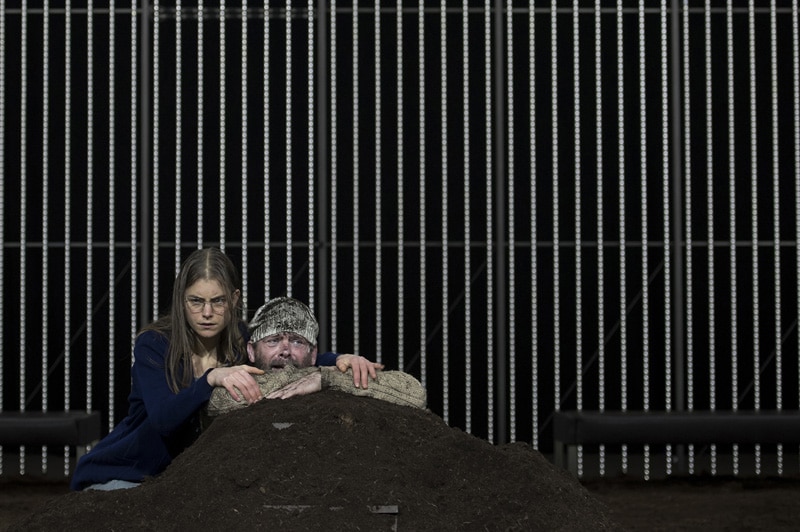Wie een historisch theaterstuk geloofwaardig naar het heden wil verplaatsen, kan maar beter radicaal te werk gaan, moet regisseur Theu Boermans gedacht hebben. En wie zijn bewerking van Nikolaj Gogols De Revisor bij het Nationale Toneel ziet, kan niet anders dan hem gelijk geven. Met verwijzingen naar asielzoekers, kleedhokjesgluurders, dataspionage en subsidiefraude lijkt het stuk gisteren geschreven. Toch blijft Boermans trouw aan de essentie van het 19e eeuwse origineel. Net als Gogol neemt hij alles en iedereen op de hak: de ambtenarij, corruptie, de kerk, maar ook hoogdravende toneelmakers en zelfs zijn eigen succesmusical Soldaat van Oranje.
‘Iedereen heeft ervan langsgekregen, en ik nog het meest!’ zou de tsaar grinnikend gezegd hebben na afloop van de première van De Revisor in 1836. Maar Gogol bespotte niet alleen de corrupte Petersburgse bureaucratie. Hij liet vooral zien dat het vlees bij ieder mens zwak is als de verleiding maar groot genoeg is. En verleidingen zijn van alle tijden.
Het verhaal
In een stadje op het Nederlandse platteland weet het gemeentebestuur zijn eigen zaakjes voortreffelijk te regelen, tot de komst van een staatsinspecteur (een ‘revisor’) wordt aangekondigd. In paniek zien de bestuurders een willekeurige vreemdeling ten onrechte voor de revisor aan en leggen hem in de watten. Als de bezoeker, met veel flair gespeeld door Joris Smit, begrijpt hoe de vork in de keel zit, groeit hij in zijn rol en laat zich de vleierijen, omkoperijen, dinertjes en de liefde van de burgemeestersdochter gewetenloos aanleunen.
Acteur speelt acteur
Boermans heeft in zijn bewerking voor het Nationale Toneel extra lagen toegevoegd. Zo is de zogenaamde revisor in werkelijkheid niet een eenvoudige kantoorbediende, zoals bij Gogol, maar een toneelmaker genaamd Olaf de Heer. Die wijdt uit over de ware kunsten als tegenwicht voor het aardse, maar gebruikt zijn toneeltalenten ook om de kluit met steeds meer overtuiging te belazeren. Dat gaat zover dat hij beweert de boeken van Kluun en de musical Soldaat van Oranje te hebben geschreven, onder pseudoniem. Uiteindelijk geeft hij de achternaam “De Heer” betekenis als hij, in musicalstijl zingend, de swingende Messias uithangt te midden van zijn bewonderaars.
Knuffelasielzoeker
Een tweede aanpassing betreft de meereizende bediende van De Heer. Die is bij Boermans asielzoeker Osman geworden (een soms ontroerende, soms hilarische Mark Rietman). Osman werkte mee aan een toneelproject: veertig échte asielzoekers zes uur lang op een draaischijf (‘als metafoor voor de molen waarin ze terechtkomen’). Totdat De Heer nog vóór de première zijn subsidiegeld vergokte. Osman wordt de knuffelasielzoeker in het stadje dat absoluut geen AZC wil. Hij wil eigenlijk terug naar Damascus, maar vindt aansluiting bij de kinderlijk gebleven oudste dochter van de burgemeester, een ingetogen rol van Hannah Hoekstra. Interesse in elkaars geloof brengt de twee tot elkaar.
Dwars door het verhaal heen speelt de amateurmusical De Ark van Noach, waarvoor het stadje repeteert. Met Boermansiaans spektakel kruipt het dierenrijk juist knorrend en tokkend rond een geïmproviseerde berg Ararat, als een onderschepte mail van de revisor aan de pers duidelijk maakt dat ze allemaal opgelicht zijn.
Een groot deel van het ensemble van het Nationale Toneel krijgt de kans zich in deze komedie uit te leven. Zo krijgt Smit uitstekend tegenspel van Stefan de Walle als vaderlijke doch vileine burgemeester en wedijvert Antoinette Jelgersma als burgemeestersvrouw met haar opgefokte dochter (Diewertje Dir) om de gunst en begeerte van de revisor. Sterk zijn ook Dries Vanhegen en Betty Schuurman als ruziënde wethouders van PVV en PvdA.
Zuidelijk accent
Punt van twijfel is het accent waarmee de acteurs spreken. In een interview in huis-aan-huiskrant De Posthoorn (pagina 17) zei actrice Betty Schuurman dat het flauw zou zijn Limburgs te spreken. Daarom moest het een Drents accent worden. Ergens in de try-outs is dat Drents blijkbaar alsnog gesneuveld ten gunste van een zuidelijker klank. ‘O Chod,’ roept de burgemeester als hem de komst van de revisor ter ore is gekomen. Je kunt je afvragen of dat wel iets toedoet aan de voorstelling. Tegenover een lacherig momentje in het begin staan er vele waar de verstaanbaarheid op het spel staat. Achterin de zaal zijn de acteurs vaak moeilijk te volgen als ze met accent door elkaar spreken. En de onderliggende boodschap dat macht corrumpeert, altijd en overal, wordt afgezwakt door een wijzend vingertje richting zuiden.
Bewindspersoon
Toch is De revisor vooral een groot succes voor Theu Boermans. Diens gedurfde visie maakt het stuk tot toneel van vandaag. Een komedie die echt heel grappig is en actueler dan bijvoorbeeld Shakespeare-kluchten met hun wel erg complexe intriges en dei ex machina. En een komedie voor iedereen wiens vlees weleens zwak is. Bij het verlaten van de zaal hoorde ik een bewindspersoon – tsaar of bojaar van onze tijd – mompelen: ‘Hier moeten we met de hele club naar toe!’
- Gezien: 16 januari 2016. Tournee tot en met 5 maart.
- Let op! Reprise van 22 tot en met 28 december 2017

